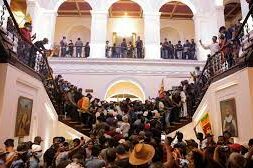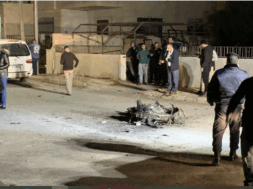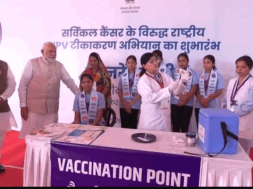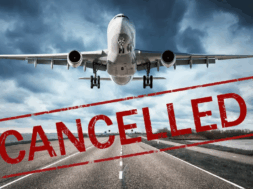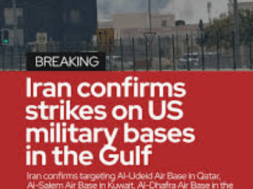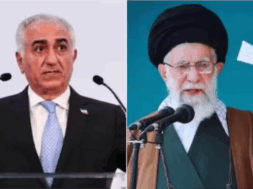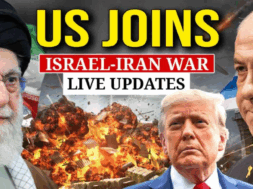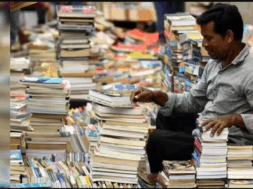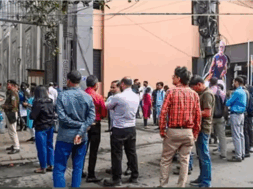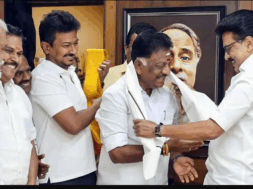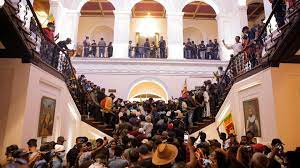
Amidst Storming of Presidential Palace, India Says It “Stands with People of Sri Lanka”
Manas Dasgupta
NEW DELHI, July 10: As the Sri Lankan protesters continued to roam around the presidential palace determined not to leave till the president and the prime minister quit, Sri Lankan main opposition parties are preparing to meet to make arrangements for an all-party government to temporarily take control of the anarchy that has besieged the country of 22 million amidst acute shortage of fuel and food.
Amidst Sri Lanka’s economic crisis, India on Sunday said it stood with the people of Sri Lanka. In a carefully crafted statement, the Foreign Ministry said, “India stands with the people of Sri Lanka as they seek to realise their aspirations for prosperity and progress through democratic means and values, established institutions and constitutional framework.”
Pointing to the financial aid that India extended to the island nation as it battles its worst economic crisis, the statement said Sri Lanka occupied a central place in its “Neighbourhood First policy.” “India is Sri Lanka’s closest neighbour and our two countries share deep civilisational bonds,” it added.
The External Affairs Minister S. Jaishankar told media persons outside the Thiruvananthapuram airport on Sunday that the Indian government had always been supportive of Sri Lanka and it was “trying to help” the neighbouring country through its present economic crisis. He also made it clear that at least as of now India was not facing any refugee crisis from Sri Lanka. “They are right now working through their problems, so we have to wait and see what they do,” he added.
Sri Lanka’s main Opposition parties are expected to hold a special party meeting in the next couple of days to forge consensus on establishing an all-party government. The meeting of the main Opposition Samagi Jana Balavegaya (SJB) and its constituent parties will be attended by leader of the Opposition Sajith Premadasa, leader of Sri Lanka Muslim Congress Rauff Hakeem, leader of Tamil Progressive Alliance Mano Ganesan and leader of All Ceylon Makkal Congress Rishad Bathiudeen, Sri Lankan media reports said.
Another meeting of the leaders of nine parties, including the National Freedom Front, was planned for Sunday to discuss the emerging political situation. Vice President of the Communist Party of Sri Lanka Weerasumana Weerasinghe said there would be a lengthy discussion about the all-party government.
The Parliament Speaker Mahinda Yapa Abeywardena would become the acting President in the absence of both the President Gotabaya Rajapaksa and the Prime Minister Ranil Wickremesinghe who have offered to resign but are still hanging on to their posts. Later, an election among MPs must happen to elect a new President and the Prime Minister.
The anti-government protesters in Sri Lanka who broke into President Rajapaksa’s official residence have claimed to have recovered millions of rupees inside his mansion, according to a media report on Sunday. A video is being shared on social media showing the protesters counting the currency notes that were unearthed. The recovered money was said to be handed over to the security units, media reports said.
Hundreds of anti-government protesters on Saturday barged into President Rajapaksa’s residence in central Colombo’s high-security Fort area after breaking the barriers, as they demanded his resignation over the island nation’s worst economic crisis in recent memory. Another group of protesters entered the private residence of Wickremesinghe and set it on fire. The police on Sunday arrested three persons for setting fire to Wickremesinghe’s private house.
The leaders of the anti-government protest movement, who have prompted the president and prime minister flee their official residences, Sunday said they would occupy the mansions until the two quit office. “The president has to resign, the prime minister has to resign and the government has to go,” its leader playwright Ruwanthie de Chickera said.
According to the parliamentary speaker, President Gotabaya Rajapaksa will step down on July 13, following violent protests that shook the capital on Saturday. Ranil Wickremesinghe also said he was willing to resign to make way for an all-party government, his office said in a statement on Saturday evening.
Embattled President Gotabaya Rajapaksa, whose location is still unknown since the protesters overran both his office and the official residence, has ordered officials to ensure the smooth distribution of cooking gas after the fuel-starved country received 3,700 metric tonnes of LP gas, his office said on Sunday. In recent months people have been blocking roads across the country in a desperate bid to force the government to address the issue of acute gas shortages.
Awe and anger engulfed the Sri Lankan protesters who roamed through the ransacked presidential palace seeing the grand lifestyle of the leaders and their own deplorable conditions. However, calm returned to the commercial capital, Colombo, a day after protesters stormed the building and forced President Rajapaksa to announce his resignation.
Amazed ordinary folk took the opportunity to inspect the colonial-era building. Members of the security forces, some with assault rifles, stood outside the compound but did not stop people going in.
In May, President Gotabaya Rajapaksa’s elder brother and Prime Minister Mahinda Rajapaksa had to quit in the face of massive anti-government protests. The Rajapaksa brothers, Mahinda and Gotabaya, were hailed by many in Sri Lanka as heroes for winning the civil war against the LTTE but they are now blamed for the country’s worst economic crisis.
Sri Lanka is under the grip of an unprecedented economic turmoil, the worst in seven decades, crippled by an acute shortage of foreign exchange that has left it struggling to pay for essential imports of fuel, and other essentials. The country, with an acute foreign currency crisis that resulted in foreign debt default, had announced in April that it is suspending nearly USD 7 billion foreign debt repayment due for this year out of about USD 25 billion due through 2026.
The political chaos could complicate efforts to pull Sri Lanka out of its worst economic crisis. The International Monetary Fund (IMF), which has been in talks with the Sri Lankan government for a possible $3 billion bailout, said on Sunday it was monitoring events closely. “We hope for a resolution of the current situation that will allow for resumption of our dialogue on an IMF-supported programme,” the global lender said in a statement.
The economic crisis developed after the COVID-19 pandemic hammered the tourism-reliant economy and slashed remittances from overseas workers. It has been compounded by large and growing government debt, rising oil prices and a seven-month ban on importing chemical fertilisers last year that devastated agriculture.
